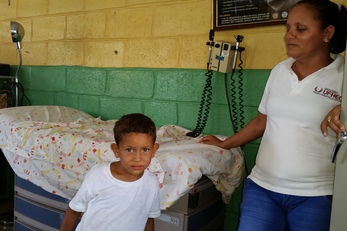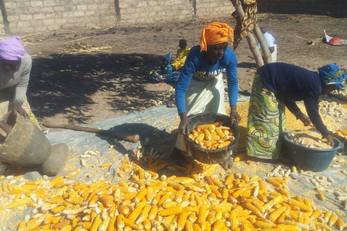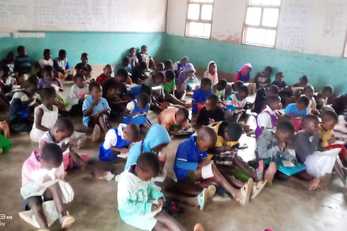







Culinary Activism: Cooking a Coral Reef Threat (Activismo Culinario: Cocinando una Amenaza del Arrecife)
Project Launch:
In Veron, on the Eastern tip of the Dominican Republic, there was once a vibrant coral reef ecosystem. In recent years, overfishing and the growing influx of lionfish, an invasive species that feeds on native fish populations that protect the reef system, have caused alarming reef degradation. This innovative cooking project will protect the reef from the problematic lionfish by teaching young women to cook the lionfish and to promote their culinary skills in nearby hotels to increase market demand. They will also be working directly with and improving the livelihoods of local fisherman, who will benefit from the new market opportunity.
This project was kicked of in April earlier this year and is off to a great start. A local hotel (Hotel Vern) donated their kitchen for the use of the project, which was brokered by local government officials, and local radio and television stations have taken a keen interest in the project, hosting project leaders on their shows. Manantiales, the local middle school, has welcomed the project leaders into 7th and 8th grade classrooms to teach. Save the Children Dominican Republic has donated most of the transportation. The Tortuga Bay Restaurant in Punta Cana provided project leaders with a tour of their kitchen and a chance to speak with a chef who prepares lionfish for their clients. That experience was such a success that all three participants decided that in addition to leading the Culinary Activism course, they wanted to give dynamic lectures at the local middle school and at a national Brigada Verde conference in Monte Cristi (over 9 hours away from their community). Their "lionfish talk" was so well received that a local radio station (Radio Mambo) invited project leaders to perform it live on radio, and they have been guest speakers on what has become known as the "Green Segment" every Friday since. The biggest challenge for the project so far has been in setting up a reliable purchase of lionfish with local fishermen as original preliminary suppliers were unreliable and unreachable. Because of these difficulties, the group is now working with one dependable fisherman. Many fisherman are less interested in participating because there is still not high demand for lionfish and hunting lionfish is difficult. The project aims to continue working to influence demand for lionfish in the area.
Testimonials
"My biggest satisfaction of this project is working with the young women of my Green Youth Brigade. Many are a decade younger than I and most have lived their whole lives in a poor shantytown, but their leadership amazes me. Take Katherin, who is 17 years old and has just finished 8th grade. Because of documentation issues (she is half Haitian), she cannot attend high school. This is a young woman who has faced racial discrimination her whole life. But she traveled two days to the opposite corner of this island and stood in front of nearly a hundred Dominican youth and their Peace Corps volunteers, and demonstrated how to remove poisonous lionfish spines. Though she will never be allowed to enroll in college, she has given lectures to over 200 students." - Sabine, Peace Corps Volunteer, Veron, Dominican Republic
"Lionfish really are magnificent creatures," says 14 year old project leader Desire, "and they're delicious!" As for the spines? "At first I was nervous," Desire admits, "but then I got used to cutting them, and now it's actually fun!"
Explore other Projects





